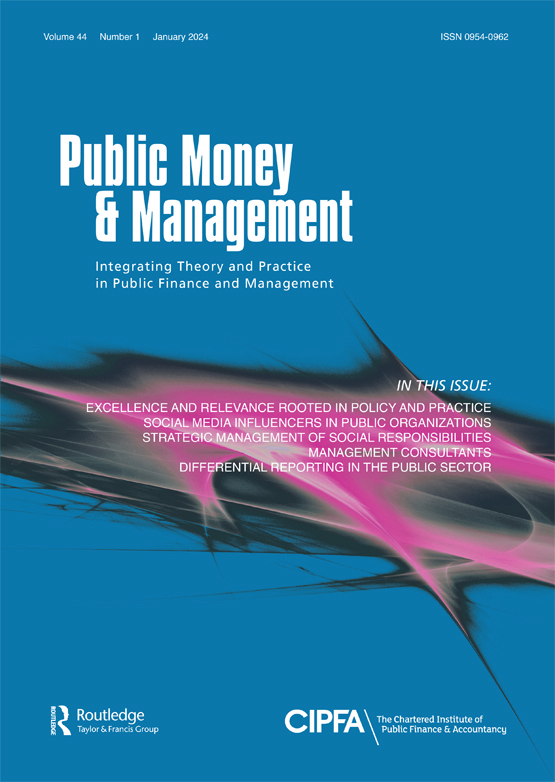Submit a Manuscript to the Journal
Public Money & Management
For a Special Issue on
Data science and financial information in the public sector—challenges for accounting and accountability
Manuscript deadline
01 June 2024

Special Issue Editor(s)
Deborah Agostino,
Polytechnic of Milan, Italy
[email protected]
Enrico Bracci,
University of Ferrara, Italy
[email protected]
Isabel Cruz,
University of Coimbra, Portugal
[email protected]
Susana Jorge,
University of Coimbra, Portugal
[email protected]
Ricardo Lopes Cardoso,
Fundação Getúlio Vargas, Rio de Janeiro, Brasil
[email protected]
Rui Lourenço,
University of Coimbra, Portugal
[email protected]
Data science and financial information in the public sector—challenges for accounting and accountability
Recent digital transformations and the use of big data have created risks and opportunities in public sector entities and government. The growth of analysable data is challenging established paradigms (https://doi.org/10.1007/s00187-020-00295-z). Using algorithmic-based technologies (such as artificial intelligence [AI]) can change the way decisions are made, the processes and competences, and the relative power of actors both within and outside these organizations (https://doi.org/10.1108/AAAJ-03-2017-2880). The recent pandemic context has exacerbated these effects (https://doi.org/10.1111/faam.12307).
Governments and public sector organizations are now making considerable use of digital technologies, for example to define public policies, provide public services and report about financial performance (https://doi.org/10.1080/09540962.2020.1764206). This is impacting on accountability and ultimately on citizens’ engagement and trust in politicians (https://doi.org/10.1108/aaaj-07-2020-4713). Moreover, governments have used AI to enhance surveillance of citizens and organizations (https://doi.org/10.1007/s13347-016-0219-1; https://doi.org/10.1108/JPBAFM-12-2019-0181), while citizens and civic organizations are using big data and AI to monitor governments and to prepare counter accounts (https://doi.org/10.2308/jeta-52096). Although digital transformation has undoubtedly facilitated public management overall, there are pernicious effects, such as increasing the cyber-vulnerability of digitally open governments and public organizations.
‘Data science’ is an umbrella term for an interdisciplinary field that uses scientific methods, exploratory processes, algorithms and systems to extract knowledge from data (https://www.ijesm.co.in/uploads/68/7393_pdf.pdf). Data science use in the public sector is bringing new challenges for accounting professionals (https://doi.org/10.1111/faam.12313), as well as for public officials and politicians who use this information to make decisions and manage public sector entities and governments (https://doi.org/10.1111/faam.12301). Data science and and digital transformation has also challenged accountability, pointing to new types and forms of reporting, with implications for preparers, standard-setters and auditors (https://doi.org/10.1111/faam.12300).
This new PMM theme will address the impact of data science on public sector financial information and reporting. It will examine the opportunities and challenges faced by accounting professionals (for example accountants, auditors and consultants) in producing information, as well as by public managers and policy-makers as data users. Contributions are particularly welcome on how accounting and accountability can help to deal with these opportunities and challenges or, on the contrary, neglect them. Articles on the positive and pernicious effects of data science in reporting, transparency and accountability are invited. Topics to be covered include the following:
• The impact of digital transformation on professionals as co developers, preparers and translators/brokers of accounting information.
• The challenges in designing, implementing and using algorithms, blockchain and/or data analytics for public sector financial information.
• Educational and training needs of accounting professionals related to digital transformation.
• The impact of digital transformation on controlling practices.
• Financial decision-making processes in public sector organizations.
• The role of legal frameworks, possibly creating entropy to the real benefits of digital transformation and data science for accountability and decision-making.
• How accounting systems can adapt and support users, while protecting them from the pernicious effects of digital transformation.
• How data science can support the use of financial information for public policies and decision-making, including gender equality policies.
• Digital vulnerability of public sector reporting and cybersecurity problems.
• Interaction between human and non-human actors and impact on accountability.
• Challenges for auditors and credibility of data and information.
• The impact of data science on the surveillance of citizens and organizations by governments for financial management purposes.
• Overall impact of data science on transparency of governments and the public sector.
These topics are only suggestions. All articles on the impact of data science on public sector accounting and accountability practices are welcome. Please feel free to discuss your ideas with the guest editors.
Looking to Publish your Research?
Find out how to publish your research open access with Taylor & Francis Group.
Choose open accessSubmission Instructions
This theme will include research articles (maximum 8,000 words, including references), new development articles (maximum 3,500 words) and debate articles (maximum 1,000 words). Articles that are innovative in their approach, in terms of themes, methods of data collection and theories are especially welcome.
Research articles must be suitable for both academic and reflective practitioner readers and are subject to the same conditions as PMM’s freely submitted articles as explained in PMM’s instructions to authors:
https://www.tandfonline.com/action/authorSubmission?show=instructions&journalCode=rpmm20
The deadline for submissions of research articles is 01 June 2024. Each research article will be sent to at least two independent reviewers for double-blind peer review (in the same way as regular submissions to PMM); guest editors will conditionally accept for publication but final publication decisions are with PMM’s editors. The deadline for new development and debate articles is 01 August 2024. Accepted articles will be published online in early 2025 with hard copy publication to follow.
Authors must submit research and new development articles through ScholarOne (https://mc.manuscriptcentral.com/rpmm). Select the special issue: Data science and financial information in the public sector